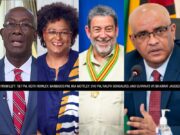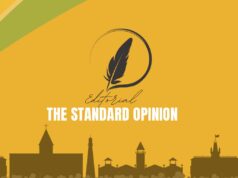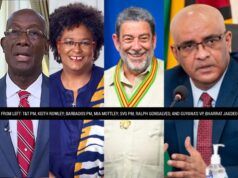Many countries, including Guyana, lack the scientific data that explains the oceans’ role when it comes to sustainable development. In fact, when it comes to this South American country, “much of the topography of the ocean floor remains unknown and unmapped.” This is according to British High Commissioner to Guyana, Mr Greg Quinn.
Quinn’s remarks in this regard were forthcoming even as he addressed a simple ceremony at the Harbour Masters’ Boathouse to hand over to the Guyana Maritime Administration (MARAD) hydrographic equipment totalling $68M, compliments of the United Kingdom’s Hydrographic Office. The sizeable endowment is in support of Guyana’s commitment towards the safe and sustainable use of its marine resources. Among the equipment is a multi-beam echo-sounder that will be installed on the vessel MT Aruca.
Speaking at the ceremony, Quinn assured that Guyana is poised to make progress towards mapping of its ocean floor since partnering with the Commonwealth Marine Economies (CME) Programme. In addition, the British High Commissioner urged that mapping be done consistently.
“Going forward, work will have to be undertaken to map the constant changes which happen in a dynamic environment such as the ocean.”
He explained that efficient nautical navigation and related marine activities, such as scientific research, security and defence, and environmental protection are some of the areas that would stand to benefit from consistency in mapping the changes.
He moreover praised Guyana’s admission as the 90th member of the International Hydrographic Organisation. This membership took effect in May. “In its own small way, the equipment we are giving today will help Guyana to meet its obligations of membership,” he said.
Meanwhile, representing the Ministry of Public Infrastructure at the handing over ceremony was MARAD’sDirector-General, Claudette Rogers, who cited the significance of staff being trained to properly use the hydrographic equipment. Director-General Rogers said the training would facilitate the compilation of modern navigational charts of the priority areas and will improve access for commercial shipping, ultimately reducing the cost of both import and export by sea.
Cruise tourism and its associated economic benefits are some of the prospects generated from having the trained staff, she noted. She said too, “The work will also reduce risk to life and the environment.”
During his remarks, Hydrographic Programme Manager within the United Kingdom Hydrographic Office (UKHO), Ian Davies, highlighted the UKHO’s commitment towards building capacity in Guyana’s maritime sector.
He said, “UKHO will continue to provide advice and guidance to the survey team and the National Hydrographic Committee on the planning and conduct of surveys to ensure that the data collected meets international standards and contributes not only to the safety of navigation through updated navigational charting but also provides information to be used across government to support the development and management of your [Guyana’s] coastal waters.”
Fisheries, disaster management, and climate change mitigation are some of the areas that can benefit from the hydrographic equipment.













